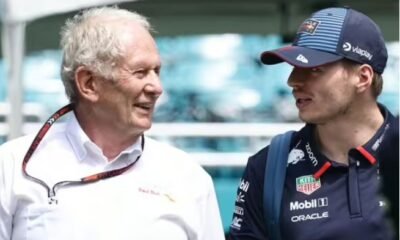Blog
What did Norris do wrong? The elements that caused his title bid to fail
After Lando Norris’ bid for a maiden Formula 1 title was officially ended by Max Verstappen, Sky Sports F1 analyse the key issues that caused the McLaren driver to fall short.
The Brit’s unlikely challenge concluded at the Las Vegas Grand Prix as Verstappen sealed his fourth successive drivers’ crown with two races to spare.
While the final standings may end up not looking very close, there were moments in late summer and early autumn where Norris had Verstappen on the back foot and appeared to be one big result away from blowing the contest wide open.
As it was, Verstappen produced one of the best drives of his career to win from 17th on the grid in the rain at the Sao Paulo Grand Prix, making it a question of when, not if, he would finish the job.
McLaren and Norris deserve great credit for giving the sport a title battle nobody was anticipating after Verstappen won four of the first five races of the season, but ultimately failed to maximise having a faster car for much of the campaign.
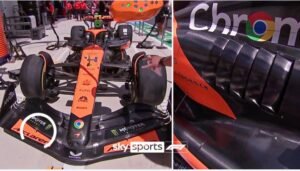
While it wasn’t the disaster of 2023, McLaren once more started the season off the pace.
Norris was only able to claim two podiums in the opening five races, one of which he likely wouldn’t have achieved had it not been for Verstappen’s retirement due to a reliability issue in Australia.
Even in Verstappen’s absence, it was Ferrari who established themselves as Red Bull’s main early challenger, with Carlos Sainz leading a one-two from Charles Leclerc in Melbourne.
It wasn’t until round five in China that McLaren unlocked some pace, with Norris taking Sprint pole and then finishing second to Verstappen in the main race.
However, the fact that the team brought a major upgrade package to round six in Miami, so significant that some described it as a B-spec car, highlighted clear shortcomings in the version of the MCL38 that began the season.
The result of the upgrades was stunning as Norris claimed his maiden F1 victory in Miami, but Verstappen had already built a big early lead, sitting 52 points ahead of the McLaren driver after the Chinese Grand Prix.
Lead-losing starts from pole
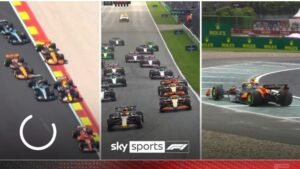
From Miami onwards, it’s fair to say that McLaren very rarely had a car that wasn’t capable of competing for victory, or at the very least in with a strong chance of a podium.
This was a major adjustment for both Norris and the team, neither of whom were in the habit of key moments in races being the difference between wins and losses, and therefore coming under greater scrutiny.
As Norris used the car’s pace to turn in some brilliant qualifying performances, a clear weakness emerged as he repeatedly failed to retain the lead on the first lap of races.
Of the seven pole positions Norris has claimed in Sprint and regular qualifying this season, he has held the lead at the end of the first lap on just one occasion, in Singapore.
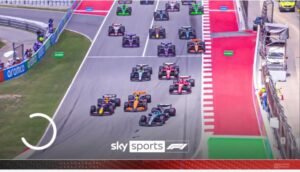
Norris lost out to both Verstappen and Mercedes’ George Russell at the start of the Spanish Grand Prix in a race he ended up finishing second to the Red Bull despite appearing to have slightly stronger race pace.
He lost out to his team-mate Oscar Piastri at the start in both Hungary and Monza, with each incident – which we’ll come back to later – proving very costly. Those incidents came either side of Norris actually recovering to win in Zandvoort after losing his lead to Verstappen off the line.
Norris inexcusably left room for Verstappen to dive up the inside at the first corner of the United States Grand Prix in Austin, hugely compromising his race, and would once more lose out from pole to Russell in Brazil.
There appeared to be no issue with Norris’ reaction time which was generally as strong as his rivals, but he seemed to repeatedly lose out in the second phase of the start, which has led some to question whether there is a car issue as opposed to driver that has cost him.
It’s impossible to know exactly how the races would have turned out had Norris led at the end of lap one on these occasions, but given the value of driving in clean air with this generation of cars, it’s hard to envisage any outcome other than the Brit scoring a lot more points.
Errors under pressure
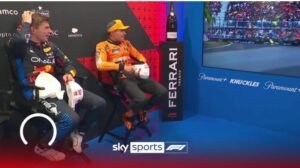
Norris’ mistakes weren’t confined to the opening lap, with a few errors in key moments also proving costly.
On a day where luck wasn’t on his side in Montreal, Norris drove brilliantly to keep himself in contention for victory but then made a crucial error by going off track as he chased down Verstappen.
The incident proved crucial as Verstappen was able to stay just ahead of Norris at the pit stops that followed soon after and prevent the Brit from building momentum in the title battle.
The strangest errors of Norris’ campaign to date came during his dominant victory in Singapore, during which he twice came extremely close to throwing it away.
Despite having pulled far enough clear to have the race under almost total control, Norris was lucky to escape with only minor front wing damage as he overshot a corner, and then later gave another barrier an unnecessary bump at high speed.

Sky Sports F1 pundit and 2016 world champion Nico Rosberg said he was “baffled” by the mistakes, which on another day could have been catastrophic.
The final notable Norris errors came in Brazil. While much of the damage had already been done by a poor start and questionable strategy call, his day went from bad to worse as errors at each of the race’s two restarts resulted in lost places.

The mistakes in Canada and Brazil came in tough conditions and under great stress, but it was in these moments that Verstappen’s brilliance shone through.
McLaren strategy indecision
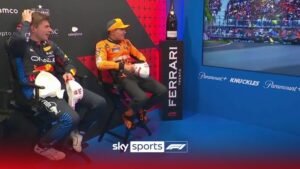
There were several occasions when Norris drove brilliantly only to be let down by questionable calls from the McLaren pit wall.
In Canada, he had seized control of the race when an unfortunately timed safety car intervened. While there were only a matter of seconds for McLaren to react as Norris approached the pit lane, they failed to do so, which meant Verstappen retook track position.
While that incident couldn’t be characterised as a huge blunder but rather coming up short of perfect, what followed a month later at Silverstone was far harder to fathom.
Norris led Lewis Hamilton and Verstappen on a drying track with a switch back to slick tyres approaching, and unlike his rivals, had new sets of all three tyre compounds available.
Verstappen stopped first for hard tyres and began to make time, while Hamilton stopped next and went onto soft tyres, undercutting Norris in the process.
Not only did McLaren miss a trick by allowing Hamilton – the eventual winner – to undercut Norris, but they also dithered over which compound to give him, asking him which of his rivals he would like to cover off rather than opting to use the medium, which team-mate Piastri would show was the right compound to be on.
Norris eventually finished third, when a better-timed stop for the medium tyre likely would have resulted in victory. Not only were the wrong calls made, but the manner in which they were decided appeared problematic.
Finally, as the rain poured down in Brazil, McLaren pitted Norris from second, as did Mercedes with leader Russell. The calls came as a virtual safety car period ended, which made stopping far less attractive and could have been reacted to.
The risk of stopping was that the intensifying rain made a full safety car or red flag seemingly inevitable, meaning any drivers who waited it out had the potential to profit massively, which was exactly what happened for Verstappen and the Alpines, who finished on the podium.
There was a bit of luck for them in that an initial call for a safety car was upgraded to a red flag when Franco Colapinto crashed, but given the high possibility of such an incident it seemed naïve for McLaren to call Norris in while his title rival Verstappen was staying out.
McLaren ultimately appeared to take the conservative option when the pressure was on, which cost them in battles with rivals hardened by previous intense championship battles.
The Piastri conundrum
It is a compliment rather than criticism, but the talent of Norris’ team-mate was sometimes more challenging than helpful for the Brit in 2024.
Not only is Piastri quick enough to occasionally beat his team-mate, but the Australian’s potential is such that McLaren were clearly wary of upsetting him by throwing their support behind Norris’ title bid.
That was most apparent in Hungary when Piastri passed Norris off the line, before McLaren’s strategy choice saw their drivers’ positions switch back over at the final round of pit stops.
Amid protestations from Norris during an all-time team radio soap opera, he finally accepted orders to give the position back to Piastri in the closing stages.
It was understandable that McLaren didn’t want to deny Piastri a maiden grand prix win, but the controversy could have been avoided with a different strategy. The Australian also left himself exposed with a mid-race error, that a driver more ruthless than Norris might have used as justification to reject team orders.
While McLaren’s rationale in Hungary was understandable, it seemed strange that after a dominant victory for Norris following the summer break in Zandvoort, the team still refused to commit to prioritising his title challenge.
They paid the ultimate price for this at Monza when Piastri, clearly understanding he was free to do so, put an impressive but aggressive move on his team-mate for the lead at the second chicane.
It was a great move but one that caught Norris by surprise coming from his team-mate, whose support he could have reasonably expected in the scenario, and left him with little choice but to yield or take them both out.
Norris lost second to Leclerc as he ran wide in the aftermath and the Ferrari driver would go on to win a race in which McLaren should have claimed a comfortable one-two, and Norris should have made major ground on Verstappen, who finished only sixth.
It is completely understandable that McLaren don’t want to make Piastri – who is also a possible future world champion – feel like a number two, but not laying down clearer boundaries resulted in what was ultimately a costly blunder in Monza.
Team principal Andrea Stella insisted throughout the season that McLaren’s priority was to win the Constructors’ Championship rather than the Drivers’ Championship, which is all very well. But with two competitive drivers naturally determined to achieve individual glory for themselves too by claiming the sport’s biggest prize, how long will that philosophy hold?
The question of approach against Max

Norris will learn many lessons from his 2024 campaign, but the most crucial may be that he needs to develop a more ruthless streak to become world champion.
In Austria, he left his car in a position where Verstappen could take him out, and paid the ultimate price with race-ending damage.
It was surprising to many that days later Norris withdrew his criticism of Verstappen and publicly accepted at least some responsibility for an incident which the stewards had penalised his rival for.
Norris insisted that he and Verstappen were still friends, although friendship didn’t seem to be on the Dutchman’s mind when he drifted into the McLaren.
Then there were the Piastri incidents in Hungary and Monza. Norris could have rejected team orders in Hungary, as Sebastian Vettel and Verstappen have done in the past, but didn’t. He was repaid by his team-mate ruining his race in Monza and may well have left Italy questioning the merits of his decision six weeks earlier.
Norris’ authenticity and openness is part of the reason he is such a valuable asset to F1 and has helped grow the sport’s fanbase, but there have been occasions where his comments may have given Verstappen encouragement.
After their controversial battle in Austin and with the title battle still hanging in the balance, Norris admitted that he felt he was not on Verstappen’s level. While it may be true, you can be sure Verstappen would have never made such a comment as he battled Hamilton for his maiden title in 2021.
There was then an outburst from Norris in Brazil in which he said he “hates” questions about the title battle, which are to be expected for a driver in the midst of a thrilling title battle.
There has undoubtedly been a huge adjustment from Norris in going from a driver searching for his first race win to fighting for the title, but the battle in sports is not solely won on the track, or field of play.
The reasons to be positive for 2025
The good news is that there is no reason why almost all of these issues can’t be overcome in 2025.
Norris has the most important ingredient required to become a world champion, which is undeniable speed.
He has shown that he can consistently go toe-to-toe with Verstappen over both one lap and full race distance, which is not something many drivers on the current grid can say.
If McLaren can hit the ground running next season, the experience gained by both driver and team should prove invaluable in launching another title bid.
There will always be errors both in the cockpit and on the pit wall, and it is reasonable to expect that improvements will be made in both aspects.
The issue that won’t be solved is the presence of Piastri, who is only likely to get better in what will be his third season in F1.
Stella is going to have a hugely difficult time keeping both drivers happy. Although with Red Bull’s quest to retain the Constructors’ Championship having been undone by an underperforming second driver, McLaren may well see any complications of effectively having two ‘number ones’ in their team as a relative luxury to manage. Yet will one of them have to eventually leave to seek absolute No 1 status elsewhere?
Norris is his own biggest critic and will know the improvements he needs to make to ensure a possible second title shot doesn’t pass him by.
-

 Blog1 week ago
Blog1 week agoJOHNSON BREAKS SILENCE: Ben Johnson, the offensive coordinator for the Lions, makes news when he renders a decision on the Saints’ alluring coaching offer of $45.2 million…
-

 Blog2 weeks ago
Blog2 weeks agoJOHNSON BREAKS SILENCE: Ben Johnson, the offensive coordinator for the Lions, makes news when he renders a decision on the Saints’ alluring coaching offer of $45.2 million…
-

 Blog1 week ago
Blog1 week agoJOHNSON BREAKS SILENCE: The Lions’ offensive coordinator, Ben Johnson, creates headlines when he decides on the Saints’ attractive coaching offer of $45.2 million
-

 Blog2 weeks ago
Blog2 weeks agoLatest NFL news: Bruce Irvin, a former Detroit Lions defensive lineman, wrote a passionate statement to the team’s owner, Sheila Ford Hamp, in which he stated that…
-

 Blog2 weeks ago
Blog2 weeks agoUNBELIEVABLE: Dan Campbell has sent shockwaves across the NFL community by suspending the key…
-

 Blog1 month ago
Blog1 month agoNigeria: Osimhen – il Napoli sta considerando uno scambio con il Milan
-

 Blog1 week ago
Blog1 week agoLatest NFL news: Bruce Irvin, a former Detroit Lions defensive lineman, wrote a passionate statement to the team’s owner, Sheila Ford Hamp, in which he stated that…
-

 Blog4 weeks ago
Blog4 weeks agoMarco Materazzi: “Spero che Paolo Maldini non torni mai al Milan”

